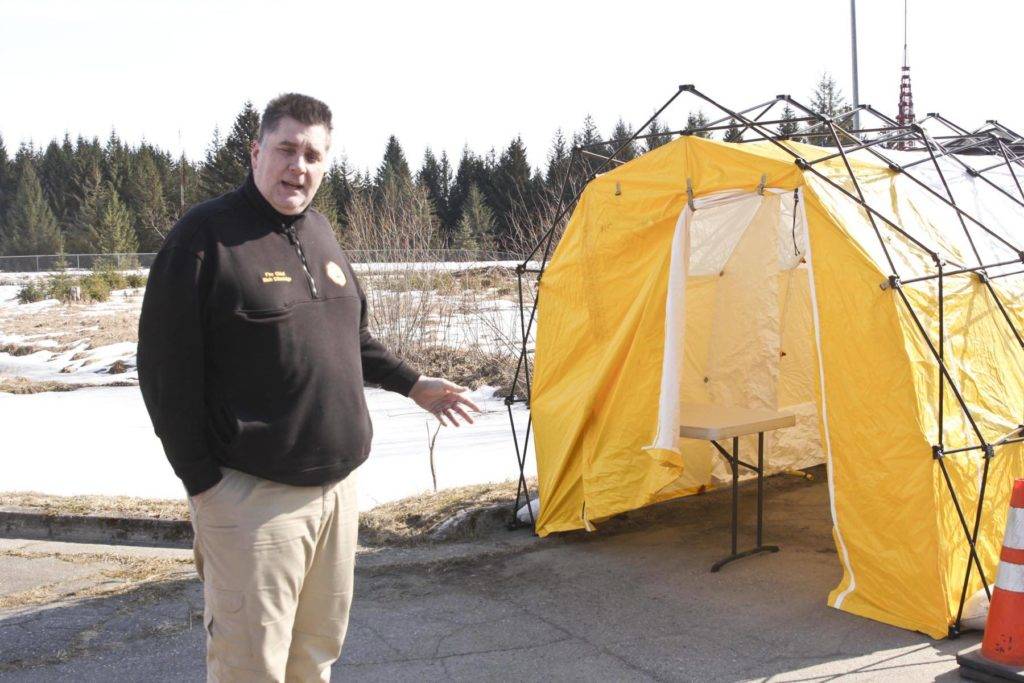While the focus of Capital City Fire/Rescue is always on protecting Juneau from injury, death and disaster, they’re looking toward the future to serve as best they can, said the fire chief during the Greater Juneau Chamber of Commerce luncheon Thursday.
“We need to look at our local issues and what we need to solve,” said CCFR Chief Rich Etheridge during the virtual event. “I think Juneau is ahead of the curve. The police and fire department are light years ahead of other departments.”
CCFR, which handles everything from fires to medical emergencies to specialist details such as rope or water rescues, has 42 full-time firefighters and EMTs, as well as 10 leadership and administrative staff, as well as dozens of volunteers and emergency hires to deal with the pandemic.
“CCFR cannot meet the needs of the community without a strong volunteer core. I don’t see volunteers going away any time soon,” Etheridge said. “Once we get volunteers in the door we want to retain them for as long as possible. Back in Benjamin Franklin’s days, it started as all-volunteer departments.”
Caring in the time of pandemic
Etheridge talked about the status of the department as it handles the coronavirus pandemic.
“We started a couple years ago looking at how we could reduce impact on the medical service,” Etheridge said. “And today, we have a global pandemic, and our fire department has been thrown right into the middle of that.”
Much of what CCFR has done in the last several months is try to minimize risk of spread among subunits possibly exposed to coronavirus, as well as trying to maximize community medicine service.
“One of the ways we’ve started is mobile integrated community health. What we’re doing is trying to reduce the demand on the ambulances,” Etheridge said. “We’re trying to fill in the gaps of the existing systems.”
Freezer stolen from Lemon Creek residence
CCFR mans its testing station at the Hagevig Regional Fire Training Center as well as a detachment at the airport to test incoming travelers. It’s also altered its operational protocols for minimizing contact with possible coronavirus carriers.
“Our EMS protocols are changed. We’re using a scout method — one person goes into the house and assesses the situation,” Etheridge said. “That’s working pretty well. It was a big shift for the responders who were used to everyone going in at once.”
Etheridge said CCFR is also stepping up leadership and management training, readying the next generation of officers for when the current leadership moves on.
Community CARE
Etheridge also talked about the growing importance of community care programs, covered under the umbrella of CCFR’s Community Assistance Response and Emergency Services.
“We’re into holistic problem solving,” Etheridge said. “We’re looking for the base cause of what’s going on and how we can change the paradigm.”
This program helps manage the warming shelter, which has been expanded through the summer in light of the coronavirus pandemic, and the sleep-off shelter, for the chronically inebriated. Etheridge specifically praised paramedic Rhys Mateo, a 20-year veteran of emergency services and a creative thinker when it comes to finding creative solutions to unusual problems.
State counts 49 new COVID-19 cases
“With the sleep-off program being added that really expands our capacity,” Etheridge said. “We’ve helped people get out of town back to family members who can take care of them. We’ve helped people get into rehab.”
Etheridge wants to expand and reinforce more of these programs, looking at handling situations before they need to be reacted to.
“We want to formalize our community-based programs,” Etheridge said. “We want to focus on the proactive instead of on the reactive. I think we need to redefine our expectations for all emergency services. I think we need to sit down with some of our stakeholders and find out what the community needs.”
• Contact reporter Michael S. Lockett at 757.621.1197 or lockett@juneauempire.com.

